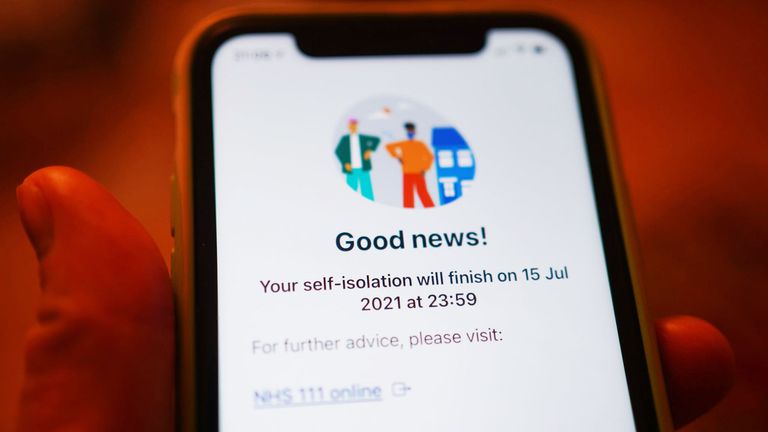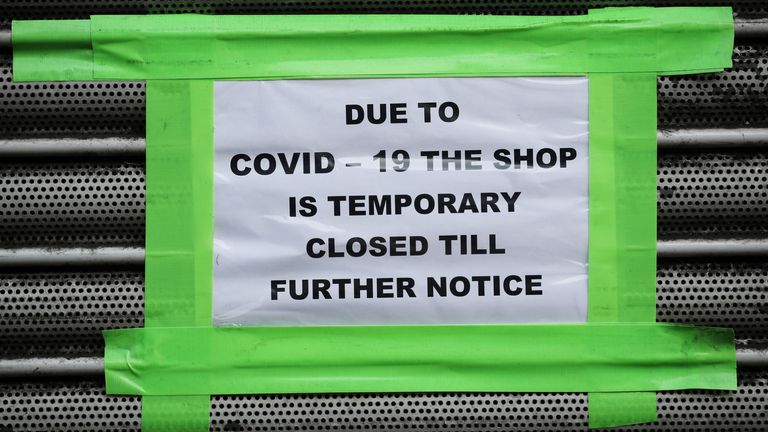Number of NHS ‘pingdemic’ COVID app alerts drop by 43% in a week
The number of alerts sent to users of the NHS COVID-19 app in England and Wales fell by more than 40% in a week.
A total of 395,971 alerts were sent to users in the week to July 28 telling them they had been in close contact with someone who had tested positive for coronavirus, government figures show.
The figure is a 43% fall from last week’s figures, which showed 689,313 alerts were issued.
It comes after the NHS COVID-19 app was updated earlier this week to ensure fewer contacts of people with coronavirus are told to isolate.
The Department for Health and Social Care said the “logic” behind the mechanism would be altered and will now only look back at contacts two days before someone who is asymptomatic tests positive, as opposed to the five days of contacts the app was tracking before.
The government said the change would mean fewer people who were in contact with a person when they were unlikely to be at the peak of their infectiousness will be told to self-isolate.
Ping alerts tell people they have been in close contact with someone who has tested positive for coronavirus.
In the week up to 21 July it is believed that more than a million people may have been told to self-isolate.
And businesses leaders had criticised the app for forcing thousands of people off work.
The CBI president said “what is needed is mass testing, not mass self-isolation”.
“It’s good to see a steep fall in those having to self-isolate, but this doesn’t mean the problem has gone away,” Lord Bilimoria said.
“The latest numbers remain too high and illustrate the frustration facing firms as existing staff shortages are exacerbated by unnecessary self-isolation. Amending the app is a welcome recognition of the problem but won’t provide the solution.
“What’s needed is a three-pronged approach to creating confidence in helping people to live with the virus.
“This starts with mass testing – not mass self-isolation – which remains key to keeping the economy open. With immediate effect the government should bring forward a test and release scheme – for people double-jabbed and for those who have not been – to end unnecessary self-isolation and unnecessary business disruption.”
Earlier this week, Kate Nicholls, chief executive of UK Hospitality – which represents the hospitality industry – said the app update was a “positive step forward”.
“But it must be brought in with immediate effect and doesn’t obviate the need for a test to release scheme to be in place to allow people safely to return to work,” she added.
From 16 August, people who are fully vaccinated will no longer have to isolate when identified as a close contact of someone who tests positive.
But there have been calls for this change to be brought forward to ease the impact of the so-called “pingdemic”.
The car industry has campaigned for this after a slump in production.
And stock levels in relation to expected sales across the distribution sector reached a new record low this month, according to a key business survey.
Ministers have resisted bringing the date forward thus far, but exemptions have been introduced for certain key industries.
These include people working in prisons, waste collection, defence, the food industry, transport, Border Force and police and fire services.
There have also been suggestions that a number of people have been deleting the app in order to avoid being “pinged”.
The Department of Health said the app “continues to play a crucial role in breaking chains of transmission, preventing hospitalisations and saving lives”, with around 40% of the eligible population continuing to regularly use it.
Analysis suggests the app prevented up to 2,000 cases a day in the first three weeks of July.
And Dr Jenny Harries, chief executive of the UK Health Security Agency, has urged people to continue using the mechanism.
“The app is the simplest, easiest and fastest way to find out whether you have been exposed to the virus, and it has saved thousands of lives over the course of this pandemic,” she said.
“I strongly encourage everyone, even those fully vaccinated, to continue using the app.
“It is a lifesaving tool that helps us to stay safe and to protect those closest to us as we return to a more familiar way of life.”
Meanwhile, a total of 189,232 people tested positive for COVID-19 in England at least once in the week to 28 July, down 39% on the previous week, according to the latest Test and Trace figures.
It is the first week-on-week fall since the week to 5 May.


